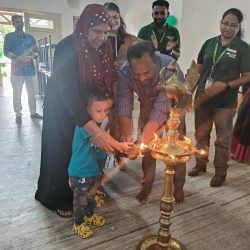The sixth National Cancer Grid Meeting Tata Memorial Hospital, Mumbai
“This is the era of evidence-based medicine.
Coming together of the cancer centres in India is a great step and the tremendous possibility of pooled resources for impacting the quality of cancer care is way beyond anything possible through individual or institutional efforts.”
These words of appreciation were spoken by Dr Soumya Swaminathan, the director of the highest academic office in India, ICMR, on the occasion of the 6th meeting of the National Cancer Grid (NCG) held at Tata Memorial Hospital on the 9th and 10th of Aug 2016.
NCG is a growing network of cancer centres in the country, with 86 institutional members currently, that aims to reduce the disparities in the standards of patient care amongst various geographic regions of India. This is attempted through development of implementable evidence-based management guidelines for common cancers. These include a systematic method of data capture of every patient being treated at a cancer center. The clinical guidelines of NCG serves the dual purpose of assessing patterns of presentation (including common cancers, stages of presentation, etc.) and needs assessment of individual centers.
Exchange of expertise and mentoring between the centers and collaborative research are other prime objectives. National Cancer Library under the NCG provides open access to ample scientific literature for all the registered individual and institutional members to encourage and support high quality clinical and research practices. Medium and long-term steps include a voluntary process of audit and peer review[1].
Dr Soumya Swaminathan, who inaugurated the NCG website, emphasized the responsibility of keeping data on public domain and looked forward to the coming together of cancer registry and the ICMR Registry.
The uniqueness of this year’s meeting was its emphasis on developing palliative care services across the centres of the NCG network. A breakout session that included experts in the field as well as oncologists with interest, discussed and presented the strategies towards achieving this objective. Dr Mary Ann presented a hub and spoke model of extending the expertise after an initial ‘gap analysis’ across the centres. A direct possibility to incorporate palliative care components within the clinical and research guidelines developed by the NCG was also discussed.
We are especially happy to note these possibilities that NCG has opened for integrating the ‘care’ component within the comprehensive cancer management in India.
An entire session was devoted to inform practical IT based solutions for data access and technological support available for simplifications in the process of patient care.
There was a detailed presentation on Education for Community Health Outcome – the ECHO model for moving knowledge to where it matters; rather than moving patients to tertiary centres away from their base. It is a solution when knowledge is trapped in the heads of few who are practicing in major cities and urban centres beyond the access of most needy patients who are spread all over. ECHO appears to be a viable model for education in palliative care in the Indian scenario. Here experts from varied geographical locations organise case based discussions at regular intervals and impact capacity building.
We are grateful to Dr C. S. Pramesh and the entire organizing team of NCG, for making Trivandrum Institute of Palliative Sciences a member and feel strengthened and inspired by knowing that terrific leaders and visionaries are in positions that matter!
1 Indian J of medical and paediatric oncology Jul 2014;33(3)





